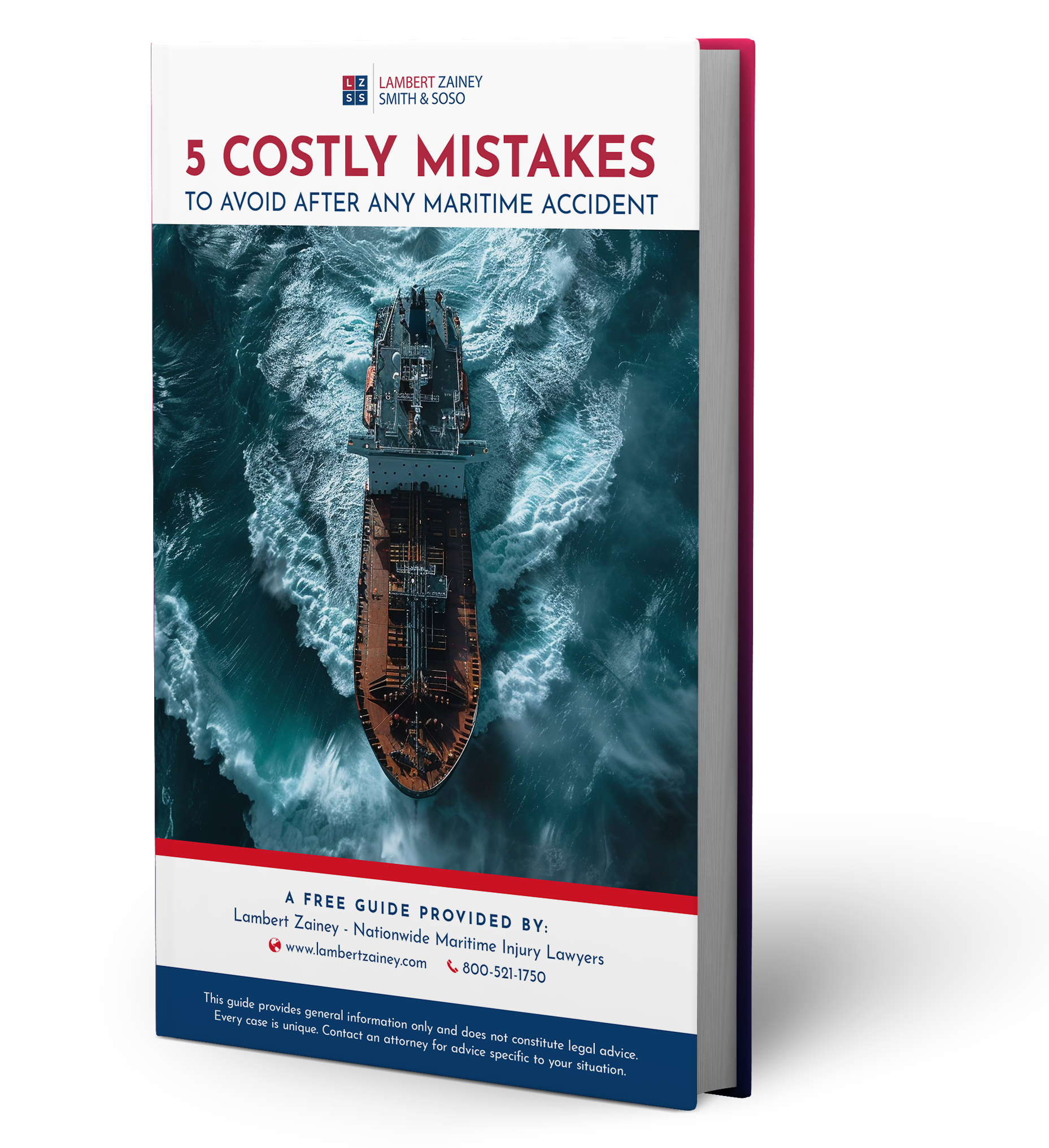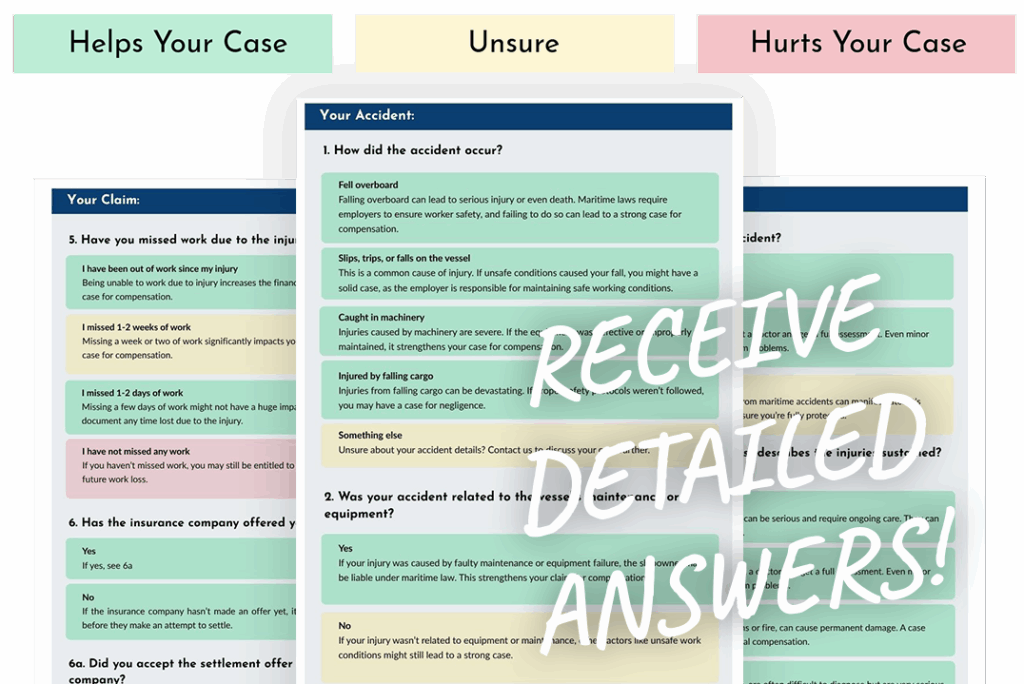If you’re a seaman working aboard a vessel on navigable waters, you’ve probably heard of the Jones Act. The Jones Act is a federal law that was passed by the U.S. Congress in 1922. Among other things, it gives a qualifying seaman the right to seek maintenance and cure benefits for any work-related injuries or illnesses. Maintenance and cure benefits are similar to worker’s compensation benefits, providing a seaman’s living and medical expenses until they are able to work again or reach the point of Maximum Medical Improvement (MMI).

When a seaman is injured in an accident that was caused by the employer’s negligence, the Jones Act also gives them the right to sue their employers for the damages resulting from these injuries. Common maritime accidents can include:
Examples of damages in a Jones Act lawsuit include current and anticipated medical expenses, lost wages, loss of employment, pain, suffering, and more.
What Is The Definition Of A “Seaman” Under The Jones Act?
Only a worker who qualifies as a seaman under the Jones Act can file a Jones Act lawsuit. The Jones Act defines a seaman as someone who:
A vessel can be any type of watercraft or vehicle intended for use in navigable waters. Generally, a seaman must spend at least 30% of their total employment time aboard a vessel to have an employment-related connection.
(If you are a maritime worker who has been injured in a work-related accident and you don’t qualify for Jones Act protections, you may be covered under the LHWCA, OCSLA, or other maritime laws. Speak to an attorney if you’re not sure.)
The Jones Act Protects Workers Who File Lawsuits
Unfortunately, some seamen choose not to exercise their Jones Act rights. They fear that by suing their employer, they’ll be placing their job in jeopardy. Are employers allowed to retaliate against employees who file a Jones Act claim against them?
Many states, including Louisiana, have “right-to-work” laws. This means that an employee without a contract can be terminated for just about any reason. However, federal laws prohibit an employer from terminating an employee for exercising their right to file a claim under Jones Act for work-related injuries. You may even be able to recover compensation through a retaliatory discharge or wrongful termination lawsuit against your employer if you can show that you’ve been fired for filing a Jones Act claim.
I Think I’ll Be Fired If I File A Jones Act Lawsuit. What Should I Do?
Despite the law, employer retaliation is not unheard of. If you believe you were terminated from your job, or have been threatened with being fired, after filing a Jones Act lawsuit against your employer, it’s important to take immediate steps to protect your rights. If you don’t already have an attorney, you need to get one ASAP. You may be entitled to additional compensation in addition to the damages caused by your injuries.
Get Our FREE Guide to Protect Your Claim
What you do after an accident is critical. Insurance companies will try to get you to make mistakes that can hurt your claim. Our free guide can help you avoid these traps.
Download our complimentary guide: “5 Costly Mistakes to Avoid After Any Maritime Accident” to arm yourself with the knowledge you need to protect your rights.
Contact an Experienced Jones Act Attorney Today
Proving that you were terminated in retaliation for filing a Jones Act claim can be a challenging task. The New Orleans Jones Act lawyers at Lambert Zainey Smith & Soso are here to help. We’ve been protecting the rights of seamen and other injured maritime workers since 1977; today, Lambert Zainey is one of the top maritime law firms in the U.S. Our attorneys have successfully represented maritime workers injured in a number of high-profile offshore injury cases, including the Arco Explosion, the Drillship Seacrest Capsize, and the Penrod Medu Collapse, recovering over a billion dollars in settlements for our clients.
The sooner you seek legal representation after your accident, the better. You can contact the law offices of Lambert Zainey through our website or call us at (800) 521-1750 to schedule a free initial consultation with a leading maritime accident attorney. We’re headquartered in New Orleans and represent injured maritime workers from all over the country.
If you’re a seaman working aboard a vessel on navigable waters, you’ve probably heard of the Jones Act. The Jones Act is a federal law that was passed by the U.S. Congress in 1922. Among other things, it gives a qualifying seaman the right to seek maintenance and cure benefits for any work-related injuries or illnesses. Maintenance and cure benefits are similar to worker’s compensation benefits, providing a seaman’s living and medical expenses until they are able to work again or reach the point of Maximum Medical Improvement (MMI).

When a seaman is injured in an accident that was caused by the employer’s negligence, the Jones Act also gives them the right to sue their employers for the damages resulting from these injuries. Common maritime accidents can include:
Examples of damages in a Jones Act lawsuit include current and anticipated medical expenses, lost wages, loss of employment, pain, suffering, and more.
What Is The Definition Of A “Seaman” Under The Jones Act?
Only a worker who qualifies as a seaman under the Jones Act can file a Jones Act lawsuit. The Jones Act defines a seaman as someone who:
A vessel can be any type of watercraft or vehicle intended for use in navigable waters. Generally, a seaman must spend at least 30% of their total employment time aboard a vessel to have an employment-related connection.
(If you are a maritime worker who has been injured in a work-related accident and you don’t qualify for Jones Act protections, you may be covered under the LHWCA, OCSLA, or other maritime laws. Speak to an attorney if you’re not sure.)
The Jones Act Protects Workers Who File Lawsuits
Unfortunately, some seamen choose not to exercise their Jones Act rights. They fear that by suing their employer, they’ll be placing their job in jeopardy. Are employers allowed to retaliate against employees who file a Jones Act claim against them?
Many states, including Louisiana, have “right-to-work” laws. This means that an employee without a contract can be terminated for just about any reason. However, federal laws prohibit an employer from terminating an employee for exercising their right to file a claim under Jones Act for work-related injuries. You may even be able to recover compensation through a retaliatory discharge or wrongful termination lawsuit against your employer if you can show that you’ve been fired for filing a Jones Act claim.
I Think I’ll Be Fired If I File A Jones Act Lawsuit. What Should I Do?
Despite the law, employer retaliation is not unheard of. If you believe you were terminated from your job, or have been threatened with being fired, after filing a Jones Act lawsuit against your employer, it’s important to take immediate steps to protect your rights. If you don’t already have an attorney, you need to get one ASAP. You may be entitled to additional compensation in addition to the damages caused by your injuries.
Get Our FREE Guide to Protect Your Claim
What you do after an accident is critical. Insurance companies will try to get you to make mistakes that can hurt your claim. Our free guide can help you avoid these traps.
Download our complimentary guide: “5 Costly Mistakes to Avoid After Any Maritime Accident” to arm yourself with the knowledge you need to protect your rights.
Contact an Experienced Jones Act Attorney Today
Proving that you were terminated in retaliation for filing a Jones Act claim can be a challenging task. The New Orleans Jones Act lawyers at Lambert Zainey Smith & Soso are here to help. We’ve been protecting the rights of seamen and other injured maritime workers since 1977; today, Lambert Zainey is one of the top maritime law firms in the U.S. Our attorneys have successfully represented maritime workers injured in a number of high-profile offshore injury cases, including the Arco Explosion, the Drillship Seacrest Capsize, and the Penrod Medu Collapse, recovering over a billion dollars in settlements for our clients.
The sooner you seek legal representation after your accident, the better. You can contact the law offices of Lambert Zainey through our website or call us at (800) 521-1750 to schedule a free initial consultation with a leading maritime accident attorney. We’re headquartered in New Orleans and represent injured maritime workers from all over the country.









